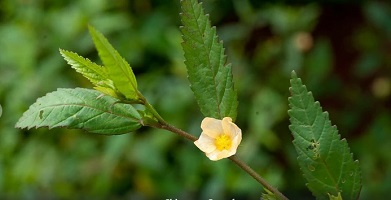Stubborn Grass; 15 Amazing Benefits & Side Effects
Stubborn Grass: 15 Amazing Health Benefits and Side Effects
Every plant in the world, including Stubborn Grass (Sida Acuta), has Health Benefits and Side Effects
Even though we generally consider them to be weeds and grasses, some of them have incredible health benefits that we may not even be aware of.
The health advantages of a well-known grass known as “the stubborn grass” will be the focus of our discussion today.
Sida acuta, also known as stubborn grass, is said to be an astringent and tonic that can help treat blood, bile, liver, and nervous system ailments as well as urinary and blood disorders.
This common wireweed, Sida acuta, is a species of flowering plant in the Malvaceae family, which also includes Corchorus olitorius ewedu. Although some regions consider it a weed, it is thought to have originated in Central America and now has a pantropical spread.

In many places of the world, it has gained acceptance and found use in the provision of healthcare.
This Nigeria’s medicinal plant Sida acuta commonly known as “Stubborn grass” is called, “Isekotu” in Yoruba, “Udo” in Igbo, and “Kalkashin kwado” in Hausa
Furthermore, it is one of those plants presently used by native people for controlling some health problems
What Is Sida Acuta (Stubborn Grass)? About
Stubborn grass, the common wireweed, is a type of flowering plant in the Malvaceae family of plants.
Although this plant has a pan-tropical distribution now and is regarded as a weed in some places, it is known to have originated in Central America (Australia, and Mexico); Botanical name: is Sida Acuta. English name: Stubborn Grass or Wireweed.
Origin of Sida Acuta
Sida acuta, often known as stubborn grass, is a species that may have originated in Central America but is now found all over the tropical and subtropical parts of the world (i.e., pan-tropical).
What is stubborn grass Good For?
Numerous studies have demonstrated how the plant can cure excruciating waist pain.
Lower abdominal pain is the cause of menses, Ankle pain, and also in treating Premature ejaculation, Irregular menses, Watery sperm, and Hormonal imbalance.
There are numerous more uses for this plant, but in this piece, we focus on the health advantages because they are the most important of them.
What are the uses of sida acuta? Functions of Stubborn Grass
Numerous portions of stubborn grass have been used to treat a wide range of maladies, including headaches, ulcers, asthma, diabetes, malaria, rheumatic diseases, neurological disorders, leucorrhea, TB, worms, and various fevers, in addition to uterine disorders, renal inflammation, and delivery.
Indigestion is treated using the plant’s juice. To prepare a poultice that is used to soften abscesses and release pus, the plant is powdered and combined with soft grease and sugar.
Wounds are bathed in a decoction of the leaves. To treat headaches, the leaves are used as a poultice on the head.
Furthermore, research has shown that stubborn grass is effective in treating agonizing waist pain.
Along with lower abdomen pain, disorders that can be treated include hormonal imbalance, irregular menstruation, watery sperm, ankle pain, and premature ejaculation.
Stubborn grass is a natural plant that is abundant in important vitamins and minerals. It enhances digestion and strengthens the immune system when ingested.
It can also improve other aspects of health, including easing gastrointestinal discomfort.
How to Make Stubborn Grass Tea
The stubborn Grass Tea Recipe is really easy to follow. The medicinal grass must be harvested before 6:00 am in the morning before sundown in order for it to function.
If not, it must be stored in a cool, wet location until you are ready to use it.
What you require
- Stubborn Grass
- Two big white balls of Onions
- 4 liters of water
Direction
- Firstly, gather three handfuls of this plant , and two large white onion balls, and wash it thoroughly with water and salt.
- After that, chop it into bits, add 4 liters of clean water to a pot, and add the 2 chopped white onion balls.
- Lastly, boil for a maximum of 15 minutes, and then sift the water to aid in your recovery. Serve hot or cold.
All good; But can you drink as much of stubborn grass tea as you want? Well, maybe not. Moderation is key
How much stubborn grass tea can you consume per day?
It’s safe to have a glass at night and in the morning. If you have any medical conditions, talk to your doctor about the dosage.
Even though tea is generally healthy, overconsumption is harmful.
Health Benefits of Stubborn Grass (Sida Acuta)
The following are a few of Sida Acuta’s health advantages:
For bacterial infections in the body, severe waist pain, ankle pain, lower abdomen discomfort during menstruation, hormonal imbalance, irregular menstruation, watery sp*erm, and rapid ejaculation.
- Dysentery; The diuretic properties of the leaves of this well-known wireweed grass. Its leaves are infused to cure dysentery.
- Indigestion; This plant’s juice has anti-inflammatory properties. It works as an indigestion treatment.
- Abscess, Pus, and Headache; To prepare a poultice that is generally used to soften abscesses and release the pus, the plant is ground to a fine powder and combined with soft grease and sugar.
Additionally, a poultice made from the leaves works wonders for headaches.
Benefits of Stubborn Graa
The following are some of the benefits of Sida Acuta:
Insomnia
You may have trouble falling asleep, having trouble staying asleep, waking up early, and having trouble falling back to sleep if you have insomnia, a common sleep problem.
Stubborn grass’s calming powers can encourage sound sleep. Additionally, it can help to ease insomnia.
Depression, stress, physical discomfort, pain, irregular sleep patterns, medicines, neurological problems, poor sleeping habits, and sleep disorders are a few of the frequent causes of insomnia.
Instructions for Using Stubborn Grass
Add bamboo leaves and almonds to Stubborn Grass and allow to boil.
Then, drink 1 glass 2 times daily
Kidney Problem
Stubborn grass has the power to decrease blood pressure, cleanse the blood, and eliminate extra water from the body.
The grass can help with kidney cleansing and is a powerful detoxifier. They may work more effectively as a result of this.
Direction
- Put the root and water in a medium-sized pot, and then heat to a boil.
- Drink half a cup twice daily.
Rheumatoid arthritis
This horrible illness produces deformity, joint discomfort, swollen ankles, and total body inflammation as symptoms.
The real cause of this terrible disease is still unclear to doctors and scientists, but it is believed to be genetic factors, a smoking lifestyle, and a contaminated environment.
Though our bodies naturally make antibodies to defend against viruses and other diseases;
Rheumatoid arthritis tends to shorten life expectancy, keeping many in wheelchairs, making some people look older, and rendering some people susceptible to dying young, according to numerous studies.
Other Benefits
Stubborn grass can treat bacterial infections in the body systems that cause symptoms like:
Severe waist pain, ankle pain, lower abdominal pain during menstruation, irregular menses, watery sperm, quick ejaculation, general weakness, kidney problem, insomnia, backache, stubborn boils and ulcers, urinary tract infection, toothache, and fever.
What Are The Side Effects Of Stubborn Grass?
Pregnancy and breastfeeding-related problems
Stubborn grass may increase menstrual flow and cause miscarriage. Steer clear of stubborn grass while pregnant.
Additionally, we don’t have enough data to recommend using Stubborn grass when nursing; therefore, be careful and steer clear.
Conclusion
If you have a routine of drinking herbal tea, stubborn grass can be one very good substitute.
Additionally, preparation is simple.
FAQs

What is the scientific name for obstinate grass?
The tropical and subtropical regions of Africa, Asia, and South America are home to the beneficial medicinal herb Eleusine indica.
What features distinguish Stubborn grass? What are the characteristics of Stubborn grass?
Habit:
A huge perennial grass that can reach a height of 15 feet; flat strap-like leaves that can be up to an inch and a half wide and many feet long.
They have thin leaf surface hairs and finely serrated leaf edges with several long hairs in the ligule.
What is the generic term for andropogon grass?
Bluestem grass
Andropogon is a vast genus of plants in the grass family that is indigenous to much of Asia, Africa, and the Americas as well as Southern Europe and a number of maritime islands.
It goes by the common names beard grass, bluestem grass, and broomsedge.
Economic importance of stubborn grass
Because they serve as a significant source of food, grasses are essential economically. Crops are grown on up to 70% of the world’s agricultural land.
Stubborn grass is a natural plant that is abundant in important vitamins and minerals is called.
When ingested, it strengthens the immune system and eases excruciating waist pain. Lower, abdominal, or ankle pain can be the cause of menstrual cramps.
Carpet Grass ~ what is the use of carpet grass?
In warm climates, carpet grass is occasionally employed as a lawn and pasture grass, but because it is a poor fodder, its use typically denotes deteriorating soil fertility.
In many regions of the world, the plant has become naturalized.
Can Sida Acne be used to treat ED? How to use Sida acuta for erectile dysfunction
Analgesic, antipyretic, antiemetic, diuretic, demulcent, anthelmintic, antiulcer, and anti-rheumatic activities of S. Acuta leaves have been documented.
In particular, S. Acuta leaf extract is an effective therapeutic agent for treating male s^xual dysfunction.
Bermuda grass
The grass Cynodon dactylon, also referred to as Bermuda grass, is widespread. It is indigenous to much of Asia, Australia, Africa, and Europe. The Americas have been introduced to it as well.
Contrary to its common name, it is not native to Bermuda and is in fact an abundant invasive species there.
Spear grass
Heteropogon contortus is a tropical, perennial tussock grass native to southern Africa, southern Asia, northern Australia, Oceania, and southwestern North America
In addition, in tropical and subtropical areas of the Americas and East Asia, the plant has established itself as an invasive weed.
Elephant grass
Cenchrus purpureus, often known as elephant grass, Napier grass, or Uganda grass, is a type of perennial tropical grass that is indigenous to the grasslands of Africa.
Its scientific name is Pennisetum purpureum. It can utilize lands that would otherwise be uncultivated because it has minimal water and nutrient requirements.
Stubborn grass and honey:
Add honey to the purslane leaves water. Drink the water three times a day, after that you will relieve the pain from the appendicitis.
Stubborn grass, scientific name: In Igbo
Sida acuta is scientific/botanical name”, and “Isekotu” in Yoruba, “Udo” in Igbo and “Kalkashin kwado” in Hausa is one of those plants currently used in traditional medicine
- Botanical name: Sida Acuta
- Osepotu in Yoruba language.
- In Igbo: Udo
- In Hausa: Kalkashin kwado
Stubborn grass spiritual benefits: spiritual uses pdf What does the grass symbolize spiritually?
It’s not only plants and flowers that have symbolic meaning – grasses also have symbolism. They stand for generosity, health, and togetherness.
The spiritual benefits of sida cuta (stubborn grass). For protection and anti-witchcraft.


